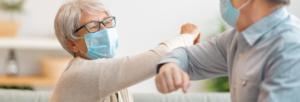Contact Tracing
January 17, 2022
Contact tracing is key to slowing the spread of COVID-19 and helps protect you, your family, and your community.
Contact Tracing Slows The Spread Of COVID-19
Contact tracing helps protect you, your family, and your community by:
- Helping people diagnosed with COVID-19 get referrals for services and resources they may need to safely isolate.
- Notifying people who have come into close contact with someone diagnosed with COVID-19 and helping them determine what steps to take, depending on their vaccination status and history of prior infection with SARS-CoV-2 (the virus that causes COVID-19). Follow-up may include testing, quarantine, and wearing a well-fitted mask.
- Discussions with public health workers are confidential. This means that your personal and medical information will be kept private and only shared with those who may need to know, like your healthcare provider.
If You Come Into Close Contact With Someone With COVID-19
- A public health worker, other professional, or the person you came into close contact with may tell you that you are a close contact and have been exposed to COVID-19.
- Follow recommendations for quarantine, testing, and wearing a well-fitted mask. Quarantine recommendations vary based on up-to-date COVID-19 vaccination status or history of prior COVID-19 infection in the past 90 days.
- Monitor your symptoms. If you have an emergency warning sign (including trouble breathing), seek emergency medical care immediately.
- If you develop symptoms, get tested immediately and isolate from others. If your test result is positive, follow recommendations to isolate.
- If you need help, health department staff can provide information about the best time to get a vaccine and resources for COVID-19 testing in your area.
If You Are Waiting For A COVID-19 Test Result Or Diagnosed With COVID-19
| If you are waiting for COVID-19 test results | If you are diagnosed with COVID-19 or have symptoms | |
| Stay away from others | Quarantine: – Stay away from others while waiting for your COVID-19 test result, especially people who are more likely to get sick from COVID-19, if possible. – If you have come into close contact with someone with COVID-19, follow recommendations to quarantine and wear a well-fitted mask. Quarantine recommendations vary based on up-to-date vaccination status or history of prior COVID-19 infection in the past 90 days. | Isolate: – Stay at home away from others (isolate), except to get medical care. – Monitor your symptoms. If you have an emergency warning sign (including trouble breathing), seek emergency medical care immediately. Stay in a separate room, away from other household members, if possible. – Use a separate bathroom, if possible. – Avoid contact with other household members and pets. – Don’t share personal household items, like cups, towels, and utensils. – Follow recommendations for isolation. |
| Think about your close contacts | While you wait for your COVID-19 test result, think about anyone you have come into close contact with starting 2 days before your symptoms began (or two days before you test if you do not have symptoms). This information can help with contact tracing efforts and help slow the spread of COVID-19 in your community. Use this resource to help you think of people you may have been around while you may have had COVID-19. | Tell your close contacts that you have COVID-19 right away so they can follow recommendations to quarantine, get tested, and wear a well-fitted mask, depending on their vaccination and booster status or history of prior infection. – An infected person can spread COVID-19 starting 2 days before the person has any symptoms or tests positive. People who have COVID-19 don’t always have obvious symptoms. – A person is still considered a close contact even if they were wearing a mask while they were less than six feet from someone with COVID-19 for a cumulative total of 15 minutes or more over a 24-hour period. – You can call, text, or email your contacts. By letting your close contacts know they may have been exposed to COVID-19, you are helping to protect everyone. – If you would like to stay anonymous, there is also an online tool that allows you to tell your contacts by sending out emails or text notifications anonymously. |
Answer The Call
If a public health worker from the health department calls you, answer the call to help slow the spread of COVID-19 in your community.
- Discussions with public health workers are confidential. This means that your personal and medical information will be kept private and only shared with those who may need to know, like your healthcare provider.
- Your name will not be shared with those you came in contact with, even if they ask. The public health worker will only notify people you were in close contact with that they might have been exposed to COVID-19.
- Public health workers may be able to connect you with other supportive services that can help you isolate or quarantine.
To learn more, please visit https://www.cdc.gov/coronavirus/2019-ncov/daily-life-coping/contact-tracing.html.